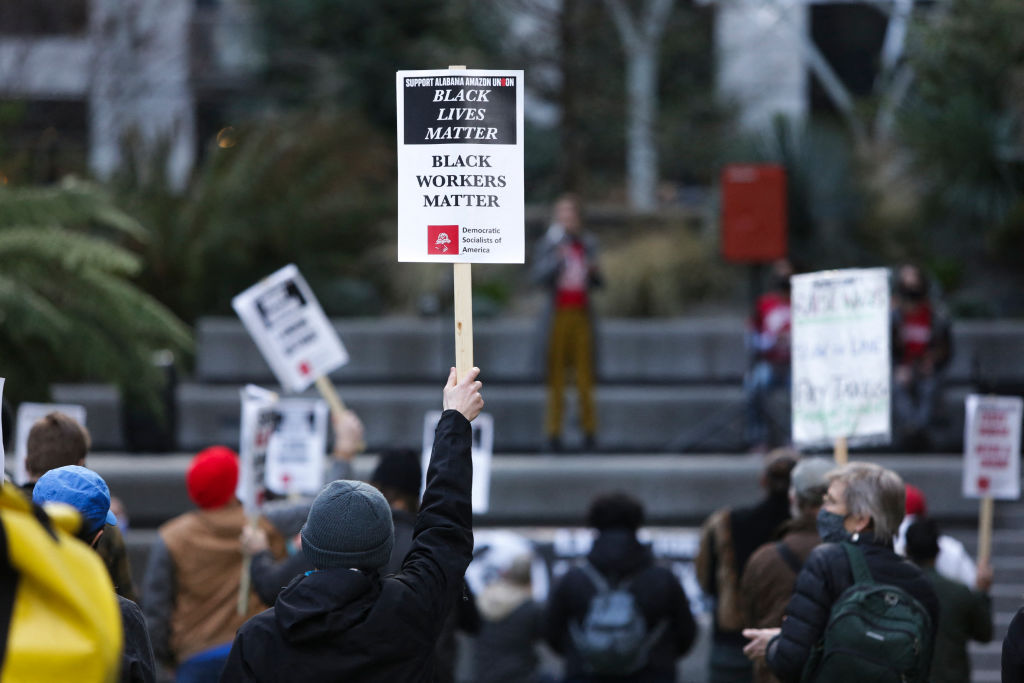Labor Day: Black-Led Unions That Have Paved The Way For Black Workers’ Rights

Source: JASON REDMOND / Getty
UPDATED: 8:00 a.m. ET, Sept. 2, 2024
Most people know about labor unions, but few know what they do. As we celebrate Labor Day in 2024, let’s take a second to reflect on Black workers’ rights and the important labor unions that have paved the way.
Labor unions help employees push for better working conditions within a workplace, which might include improving wages, hours, and safety policies. Labor unions then help workers bargain for a legally binding contract that will hold their employers accountable for implementing said changes.
MORE: Why Do We Celebrate Labor Day?
Sounds simple right? Well, historically, that hasn’t always been the case, especially for Black Americans.
Happy Black Labor Day!
The National Black Worker Center (NBWC) created Black Labor Day (BLD) to celebrate Black workers, expose the challenges they face, and advocate for their rights.
#BlackLaborDay#LaborDay#WorkingWhileBlack#ReadytoWorkReadytoLead#NBWC pic.twitter.com/Re7Kx7lbtx
— National Black Worker Center (NBWC) (@NationalBWC) September 2, 2024
Civil rights icon Dr. Martin Luther King Jr. gave his legendary speech “I’ve Been to the Mountaintop” right at the height of the Memphis Sanitation Workers’ Strike in 1968. On April 3 that year, 1,300 sanitation workers organized a massive strike against the city, demanding better safety conditions, livable wages, and union recognition.
“We’ve got to give ourselves to this struggle until the end,” King said to the fearless sanitation employees as they stood in the crowd. “Nothing would be more tragic than to stop at this point in Memphis. We’ve got to see it through. And when we have our march, you need to be there. Be concerned about your brother. You may not be on strike. But either we go up together, or we go down together.”
Read BOLD Notes: On the Importance of Black Labor Organizing at https://t.co/AEKtHB1mlJ pic.twitter.com/0LiNraHpzA
— BOLD (@BOLDblacklove) September 1, 2024
The workers were protesting the shocking deaths of Echol Cole and Robert Walker, who were crushed by a malfunctioning garbage sanitation truck. The movement was led in part by a former Black sanitation worker named Thomas Oliver Jones. As the president of the local 1733 chapter of the American Federation of State, County, and Municipal Employees (AFSCME), Jones helped the group fight for their rights.
After a series of strikes and contentious run-ins with state police officials, the City Council finally recognized the union and guaranteed better wages on April 16. The event undoubtedly served as a turning point for civil rights in Black America.
1/13/1869: Colored National Labor Union (CNLU) assembles at 1st Black labor convention in U.S. #BlackHistory pic.twitter.com/0wUIlO8nam
— Black History Heroes (@HistoryHeroes) January 13, 2017
Thankfully today, things have changed. According to a study conducted by CEPR, 14.1 percent of Black workers are unionized in 2015. On average, Black union workers earn 16.4 percent higher wages than Black non-union workers. But the work to increase this number continues. The study notes that “unionization rates for Black workers have declined across all sectors, but the decline has been especially steep for manufacturing (from 42.3 percent in 1983 to 13.3 percent in 2015).”
This labor day, it’s important for us to reflect on how far we’ve come. For Black Americans in particular, we have a storied history of fighting tooth and nail for our freedom not only to live but work in the United States. Many African American-led labor unions have helped the community throughout history gain access to the freedoms we deserve. We would be remiss if we did not give them their flowers during this holiday celebration. Let’s take a look back at history.
The post Labor Day: Black-Led Unions That Have Paved The Way For Black Workers’ Rights appeared first on NewsOne.





Post a Comment
0 Comments